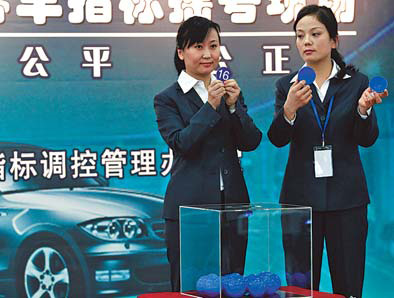Car purchase lottery starts in Beijing
For Beijing residents, owning a car is no longer merely a matter of having enough money. As authorities implement a lottery to allocate license plates, it is now more a matter of luck.
|
|
|
A lottery number is displayed on Wednesday during a complex process to determine monthly car license plate numbers under a new measure to ease Beijing's traffic gridlock. [Photo/China Daily] |
On Wednesday, Beijing conducted its first ever car license plate lottery, designed to restrict vehicle purchases and curtail worsening traffic jams.
A total of 17,600 applicants -- from more than 180,000 -- were awarded plates at Wednesday's lottery, the first since the Beijing municipal government introduced the scheme at the end of last year.
The lottery, which started at 10 a.m. in a meeting room with the Beijing Municipal Commission of Transport (BMCT), was attended by representatives of the applicants, statistics experts and transport officials.
Professor Wu Xizhi of the statistics college at Renmin University supervised and verified the lottery system.
Wu told reporters that the winning applicants were chosen randomly by the computer and that the whole procedure was conducted in line with national standards.
"The lottery was conducted under totally open circumstance. This ensured openness, fairness and equity," Wu said.
Only one in about 10 applicants were lucky enough to win a license plate at the first lottery.
The odds of winning will shrink as more applicants enter the lottery even as the monthly quota remains constant.
It is possible some applicants will not get the plates a few times, Wu said, adding that this proves the fairness of the lottery system.
"Otherwise, it won't be a lottery. It would be queuing," he said.
The lottery is at its initial stage, and further adjustments may be made, said Zhou Zhengyu, deputy secretary general of the Beijing Municipal Government, referring to those who may not be picked for one or two years or longer.
The lottery process was broadcast live on TV and the Internet to the public.
Applicants can check the results on-line 25 minutes after the lottery or by phone one hour later.
Wu Yi, an IT engineer in Beijing, attended Wednesday's lottery with seven other applicant representatives.
"I really hope I can get a plate this time, because my child is growing up and our family needs a car," Wu told reporters while waiting for the lottery results.
"If it goes the other way, I will just have to wait until next time," the young father said.
Wu was lucky. His name was listed as a winner 25 minutes after the drawing on website bjhjyd.gov.cn.
Housewife Hu Xiufeng, an applicant representative, was not so lucky.
"It does not matter. I can wait till next time," she said.
Car restrictions amid chronic gridlock
Beijing's car purchase lottery mechanism seeks to reduce new car registrations by allowing only 240,000 this year, about a third of the number registered in 2010.
Data from the BMCT shows the number of cars in Beijing more than quadrupled from 1 million in 1997 to 4.76 million in 2010.
Last year, Beijing saw an annual record of 800,000 new cars take to the already overcrowded streets.
A record 140 traffic jams were monitored on a single evening in September last year, making parts of the city resemble parking lots.
The municipal government has also introduced higher parking fees in downtown areas and stricter enforcement of traffic rules to ease the traffic woes.
In the meantime, the city authorities have vowed to freeze the number of cars owned by government organizations.
Furthermore, Beijing is investing heavily in public transport, with five new metro lines being opened last month to bring the city's total number of subway lines to 14 and the city's total subway length to 336 km.
Traffic congestion has "obviously" eased in Beijing, BMCT spokesman Li Xiaosong said.
"On average, the duration of traffic jams has been reduced by more than two hours per day - from 3 hours and 55 minutes before the new year to the current 1 hour and 45 minutes," Li said.
 0
0 








Go to Forum >>0 Comments